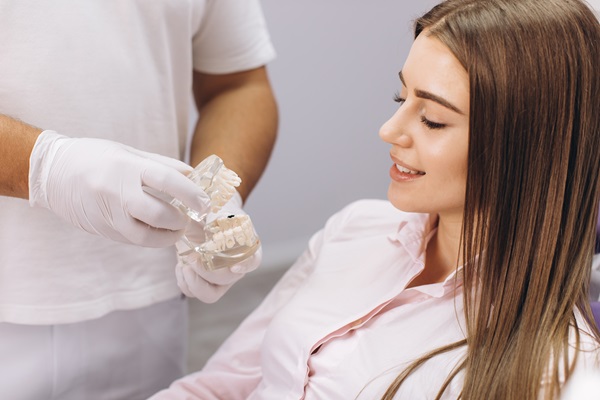What to do if Your Dental Crown Feels Loose?

Dental crowns play an essential role in restoring teeth that have been damaged or weakened. They provide protection and durability, allowing you to chew comfortably and smile confidently. But what should you do if your dental crown feels loose?
This article will guide you through the steps to take if you experience a loose crown and provide tips for preventing this situation in the future.
Understanding Dental Crowns
A dental crown, also known as a cap, is a tooth-shaped covering placed over a damaged or decayed tooth. It’s designed to strengthen the tooth, restore its shape, and enhance its appearance. Dental crowns can be crafted from various materials such as porcelain, metal, or a combination of both, and they are custom-made to match the colour and shape of your natural teeth.
Although crowns are meant to be durable, they can sometimes become loose due to factors like wear and tear, aging, or problems with the underlying tooth.
Signs of a Loose Dental Crown
If you suspect your dental crown might be loose, be on the lookout for the following signs:
- Movement or wobbling: A loose crown may shift slightly when you bite or chew, which can be an indication of an issue.
- Sensitivity: Increased sensitivity to hot or cold temperatures can signal a gap between the crown and the tooth.
- Pain: Discomfort or pain while chewing can point to a loose dental crown.
- Food sticking: Food particles may become trapped around the crown if it isn’t fitting properly.
Take action quickly to avoid further complications once you see any of these loose dental crown symptoms.
RELATED: Benefits of Dental Crowns: Discuss the Advantages
Immediate Steps for a Loose Dental Crown
If your dental crown feels loose, consider these actions:
- Contact your dentist immediately: Reach out to your dentist for an evaluation and advice as soon as you notice any problems. Timely intervention is crucial to prevent further issues.
- Avoid chewing on the affected side: Refrain from chewing on the side with the loose crown to minimise stress on the tooth.
- Maintain good oral hygiene: Continue brushing and flossing around the area. If the crown fully dislodges, remember to bring it with you to your dental appointment.
Treatment Options for a Loose Dental Crown
When you visit your dentist, they will examine the loose crown and decide on the most suitable treatment plan. Potential options include:
Re-cementing the crown
If the crown is still intact and the underlying tooth is healthy, your dentist may re-cement the crown back in place. This process typically involves applying an adhesive to the inner surface of the crown and then carefully placing it back onto the tooth. The dentist will also check your bite and make any necessary adjustments to ensure a comfortable fit.
Repairing the crown
Depending on the severity of the damage, your dentist may still be able to repair the crown. These repairs can extend the life of the crown and help maintain its function and appearance.
Replacing the crown
If the crown is beyond repair, your dentist may recommend replacing it with a new one. A temporary crown will likely be placed while the permanent crown you chose is being crafted in a dental lab. At your next appointment, the dentist will remove the temporary crown, check the fit and aesthetics of the permanent crown, and then permanently cement it into place
Addressing underlying tooth issues
In some cases, the underlying tooth may require treatment before the crown can be secured properly. This may include procedures such as a root canal or a filling.
Preventive Strategies for Long-term Crown Stability
To safeguard against future instances of loose dental crowns, proactive measures can be adopted:
- Commitment to Oral Hygiene: Adhering to a regimen of brushing twice daily and regular flossing promotes optimal oral health, fortifying the underlying tooth structure.
- Dietary Awareness: Avoiding hard or sticky foods minimises the risk of crown damage and displacement.
- Scheduled Dental Check-ups: Routine visits to your dentist facilitate early detection of potential issues, enabling timely intervention.
- Nightguard Usage: For individuals prone to teeth grinding (also known as bruxism), a night splint or night guard would be a good idea to protect the crown from too much stress. The night guard also protects your natural teeth against damage.
Wear Your Dental Crown with Confidence
Dental crowns are an excellent way to restore a tooth and maintain a beautiful, healthy smile. If your dental crown feels loose, it’s important to act quickly. Contact your dentist right away for an evaluation and discuss potential treatment options. By taking prompt action and following preventive measures, you can keep your crowns secure and your smile radiant.
Schedule your next dental visit with Whitehorse Dental! Ensure your dental crowns stay in place for years to come with the support of the best dental professionals in Blackburn. If you’re considering getting dental crowns for a better, more confident smile, Whitehorse Dental is here to give you expert advice.
Make an appointment online or call us at +61 3 4054 3454 to make sure you get wonderful, sparkling smiles!



